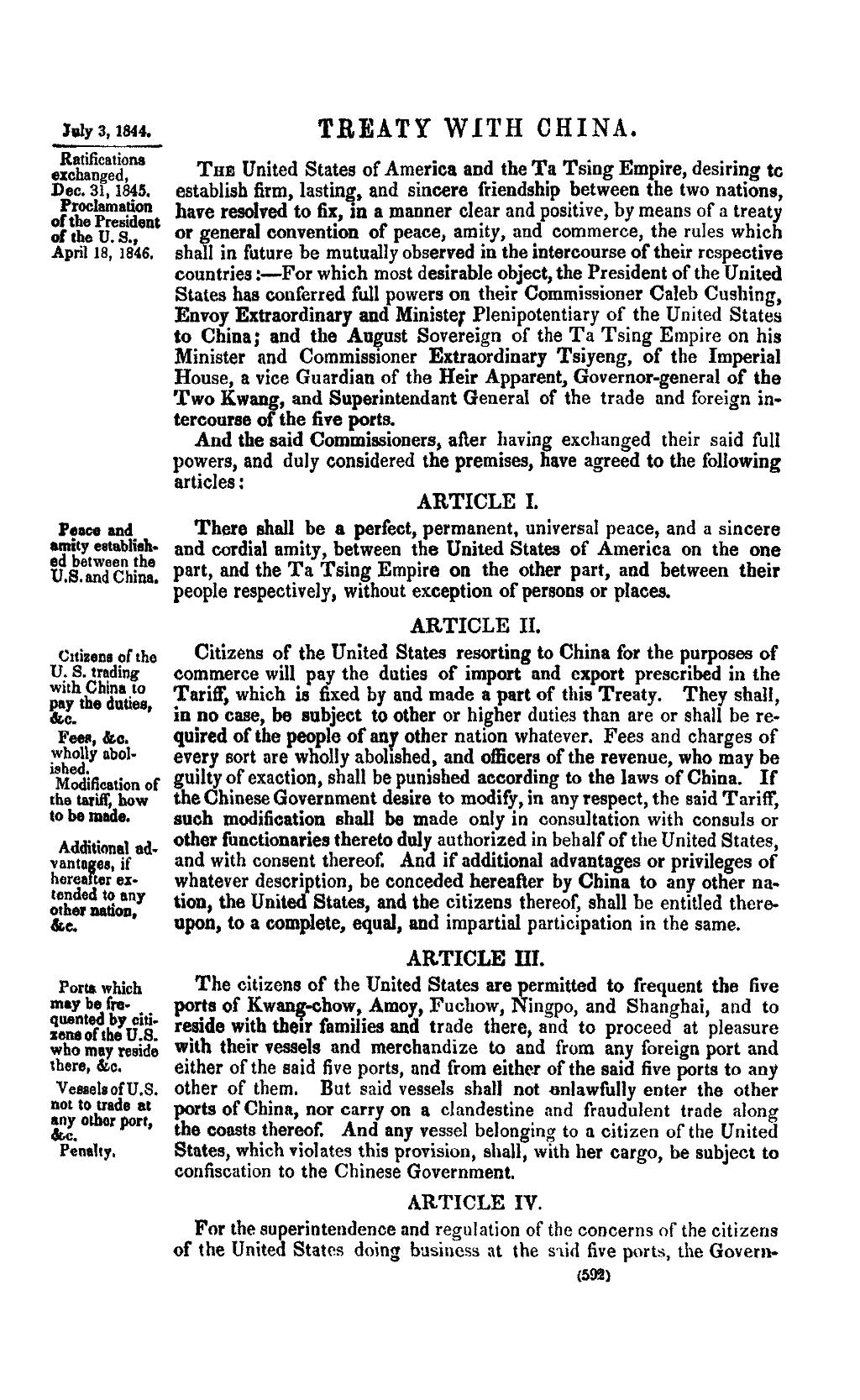July 3, 1844.{{center|Treaty with China
Ratifications exchanged, Dec. 31, 1845.The United States of America and the Ta Tsing Empire, desiring to establish firm, lasting, and sincere friendship between the two nations, have resolved to fix, in a manner clear and positive, by means of a treaty or general convention of peace, amity, and commerce, Proclamation of the President of the U.S., April 18, 1846.the rules which shall in future be mutually observed in the intercourse of their respective countries:—For which most desirable object, the President of the United States has conferred full powers on their commissioner Caleb Cushing, Envoy Extraordinary and Minister Plenipotentiary of the United States to China: and the August Sovereign of the Ta Tsing Empire on his Minister and Commissioner Extraordinary Tsiyeng, of the Imperial house, a vice Guardian of the Heir Apparent, Governor-general of the Two Kwang, and Superintendant General of the trade and foreign intercourse of the five ports.
And the said Commissioners, after having exchanged their said full powers, and duly considered the premises, have agreed to the following articles:
ARTICLE I.
Peace and amity established between the U.S. and China. There shall be a perfect, permanent, universal peace, and a sincere and cordial amity, between the United States of America on the one part, and the Ta Tsing Empire on the other part, and between their people respectively, without exception of persons or places.
ARTICLE II.
Citizens of the U.S. trading with China to pay the duties, &c.
Fees, &c. wholly abolished.
Modification of the tariff, how to be made.
Citizens of the United States resorting to China for the purposes of commerce will pay the duties of import and export prescribed in the Tariff, which is fixed by and made a part of this Treaty. They shall, in no case, be subject to other or higher duties than are or shall be required of the people of any other nation whatever. Fees and charges of every sort are wholly abolished, and officers of the revenue, who may be guilty of exaction, shall be punished according to the laws of China. If the Chinese Government desire to modify, in any respect, the said Tariff, such modification shall be made only in consultation with consuls or other functionaries thereto duly authorized in behalf of the United States, and with consent thereof. And if additional advantages or privileges of whatever description, be conceded hereafter by China to any other nation, the United States, and the citizens thereof, shall be entitled thereupon, Additional advantages, if hereafter extended to any other nation, &c.
to a complete, equal, and impartial participation in the same.
ARTICLE III.
Ports which may be frequented by citizens of the U.S. who may reside there, &c.
Vessels of U.S. not to trade at any other port, &c.
Penalty.
The citizens of the United States are permitted to frequent the five ports of Kwang-chow, Amoy, Fuchow, Ningpo and Shanghai, and to reside with their families and trade there, and to proceed at pleasure with their vessels and merchandize to and from any foreign port and either of the said five ports, and from either of the said five ports to any other of them. But said vessels shall not unlawfully enter the other ports of China, nor carry on a clandestine and fraudulent trade along the coasts thereof. And any vessel belonging to a citizen of the United States, which violates this provision, shall, with her cargo, be subject to confiscation to the Chinese government.
ARTICLE IV.
